Dangerous
The
volatility of genius is made into a study, the stage actress who invents
everything immediately gets compared with the society architect and his estate
plans in escrow. “Poetry”, said René Char, “is the side of man
refractory to calculated projects.”
She
is “mad, bad, and dangerous to know,” failure is her world,
fortunes have been lost, a leading man has died, no producer will hire her. The
real and its counterpoison are further analyzed as the grass widow and the
bookkeeper who won’t divorce her. He is now an employee of his own firm.
A
suicide pact is formed in a speeding car, she smashes them into a tree, let one
live or die, free or annihilated. She recovers, he’s badly hurt.
The
opening of a new play financed by the architect at considerable risk to his
fame and fortune is canceled, she hears the rebuke. There is no jinx,
it’s time to pay her debts. The play is rescheduled, the insufferable
husband, a bandaged milksop, sees from his hospital window the wife ascend the
steps outside, a bouquet of flowers in her arm.
The
major theme of ennui introduces the picture with Mr. Farnsworth at his club
fortifying himself against Mrs. Farnsworth’s dull dinner guests. At the
party, rich young folks (architect, sweetheart, and polo-playing chum) slip
away to sideshow amusements. In a low dive where they do not stay to drink, the
architect lingers to address the gin-swilling actress who inspired him to art.
He marries his high school sweetheart after all is said and done, and resumes
his practice.
The
trailer almost suggests a taming of the hellcat with Franchot Tone and Bette
Davis. The critics saw a tedious melodrama. Green, Haller and Orry-Kelly in
concert with the actors have put together a masterpiece of constant fascination
by creating a space in which Laird Doyle’s script operates to the last
degree of efficiency and expression. Genius is practically defined as an
element visible onscreen (Haller’s cinematography is one invention after
another), its bearer gathers herself to “climb the bitter steps”
rather than fly apart into a zillion quarks.
Davis
received an Oscar for her brilliance, modestly praised Katharine Hepburn, and
deserved it for her heroism. As so often in her career, the film was not
understood but Variety and the New York Times held the general
opinion that she carried it well.
The Gracie Allen Murder Case
The
millwheel of justice slowly grinds out “The Buzzard”, but when
Philo Vance takes the case, exceedingly fine.
A
study of nonplussedness, with Kent Taylor in the
George Burns role, the diapason of ecstasy is reached when Warren William walks
into it, “obviously the witness is in a perpetual state of confusion.”
“Oh,
thank you, Fido.” The title
character on her own is so formidable, she frightens herself.
The
mob eats its own, to spare the wealth. “Irrefragable judgement,”
says Fido.
The
two bodyguards are cited in Whorf’s Champagne
for Caesar, their dance with Vance’s new “silent partner”
is a thing of grrreat beauty.
“One
of the blackest” of the black arts, Frank S. Nugent of the New York Times called the cinema, on the
same day pronouncing against the star and this picture, “probably just
about what you think.”
Leonard
Maltin, “fitfully amusing”.
TV Guide, “silly but fun”.
Dave
Kehr (Chicago
Reader) notes the director is “underrated”.
Halliwell’s Film Guide is unimpressed, but cites Variety memorably, “smacko for
general audiences... one of the top comedies of the season.”
The Fabulous Dorseys
This
is intriguingly constructed in several ways. First, it’s a terrifically
funny, easy, entertaining film, which saves its note of tragedy for a
modulation at the end. At the same time, it borrows a MacGuffin from Reisner’s The
Big Store to make the love and musical side interest a functional
part of the film itself. The three units (Arthur Shields/Sara Allgood, William
Lundigan/Janet Blair, Tommy & Jimmy Dorsey) are kept in constant play. The
model is Laurel and Hardy, and the set pieces (dance hall, jazz club,
“Green Eyes”) are complete in themselves. The silent movie theater
scene is a masterpiece in its own right, probably remembered by Russell in Song of Summer.
Paul
Whiteman, Art Tatum, Ziggy Elman, Bob Eberly, Helen
O’Connell—it’s one of the most musically aware films from
Hollywood, from a thoroughly professional perspective. It’s the original
of Davies’ The Benny Goodman Story,
an inspiration (the opening shot’s here, for example) of Scorsese’s New
York, New York, and maybe is recalled in Malle’s Au Revoir les enfants.
Copacabana
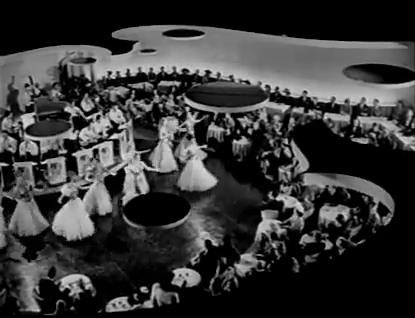
A new act for the Copa,
where the girls on the floor wait for “Leo McCarey and the rest” to
adore them, a brilliant idea.
“The
most untalented man I’ve ever seen.” Devereaux and Navarro, strictly
from hunger pangs.
Mlle. Fifi and agent and
Navarro. “Say, for a man
with no education you’ve done all right.” Carmen Miranda, a
continent in the Southern Hemisphere, a very able comedienne, a fine chanteuse.
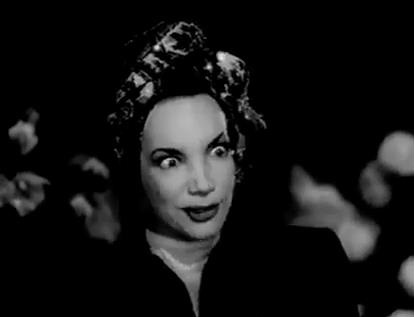
A
rival agent brimming with clientele, “this guy must handle a flea
circus.” A night at the celebrated nightspot, a fact much complained of
in Crowther’s hand-me-down review, silly ass,
Abel Green is there, Louis Sobol and Earl Wilson,
too.
A
sublime film, Groucho Marx ringmaster, a little New York glamor and
sophistication, with Andy Russell, Steve Cochran, Gloria Jean (a notable
daydream sequence begins with a dolly-in to her mind) et al. “Envy him,” says Stoppard, “his twofold
security.”
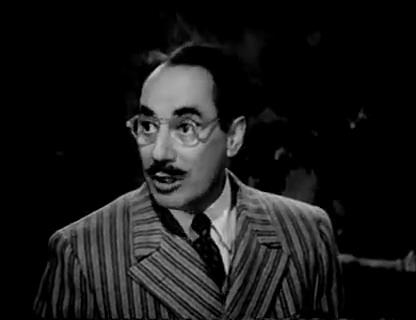
Anatole
Murphy, the Hollywood producer. “Well, if it isn’t Mr. Liggett, almost the biggest agent in town.”
“You’re
the first star in the history of show business who’s ever said a nice
thing about another star.”
“You’re
lookin’ at the smartest agent in this whole town, I just pulled the deal o’ the century.”
You can ride a bucking bronco or a pony, you can cut a calf in half and make baloney.
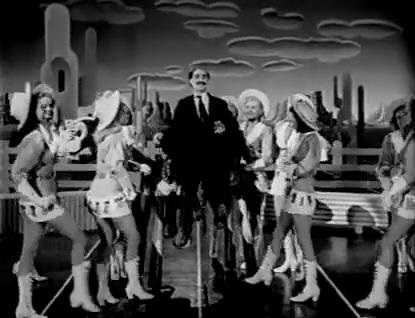
“Oh,
come on honey, spit it out, womens
to womens, uh?”
“Mademoiselle
Fifi is now floating down the East River, including
her veil and the whole outfit.”
“The
last address I had for her was at the Casbah,” ŕ la Boyer.
Green’s
study of Marshall’s The Goldwyn
Follies is a natural, it winged past the critics with amazing speed and
legerity, leaving them covered in fairy dust all over.
Bosley Crowther of the New York Times, “hand-me-down
musical frolic.” Leonard Maltin, “unengrossing musical comedy.” TV Guide, “silly farce”.
Billy Mowbray (Film4),
“uninspired
direction of a lacklustre script”.
Catholic News Service Media Review Office, “lame musical comedy”. Halliwell’s Film Guide,
“thinly produced comedy”.
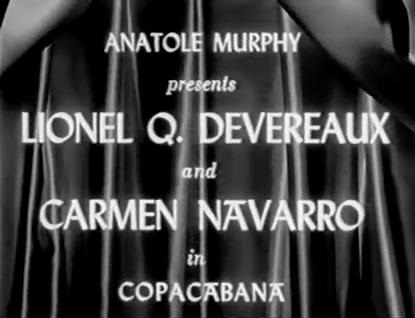
Invasion
USA
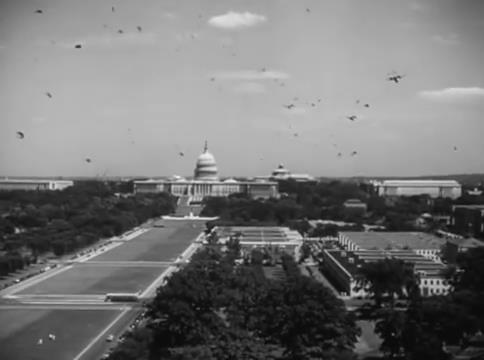
“The
People’s Government of America will take the wealth from the greedy, the
speculators, and the capitalistic bourgeoisie, and distribute it among the
workers, whose labor will never again be exploited for the benefit of the
warmongers of Wall Street.”
A
very precise forecast, down from Alaska to Puget Sound, Oregon and California,
which burns like Napoleon’s Moscow. Boulder Dam is bombed, a defense is
made at Washington, D.C., but New York falls...
Homage to Orson Welles (the Mercury Theatre
broadcast of H.G. Wells’ The War of
the Worlds).
“Tomorrow
springs from today, like—like water from a rock.”
O.A.G. of the New
York Times, “it is a ‘message’ picture.” TV Guide,
“interesting piece... still offers a provocative message.” Mark
Deming (Rovi), “spectacularly paranoid”. Halliwell’s Film Guide,
“ludicrous, dangerous, hilarious”.
Top Banana
What
the title signifies in burlesque terms, a great work of art devoted to its
subject, “what the hey!”
This
naturally is one of the works that Friedkin has to draw on for The Night
They Raided Minsky’s.
The
critical response may no doubt be understood in view of precious snobbism on
the part of reviewers.